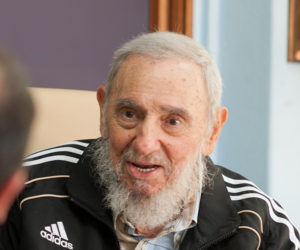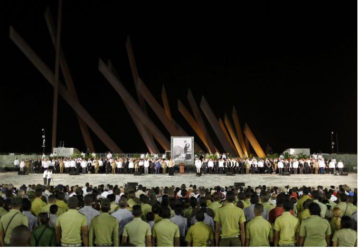Fidel Castro’s death on Friday November 25 was, arguably, one of the most profoundly anti- climactic occurrences in contemporary global politics, his end coming a decade after he had relinquished the title of ‘El Commandante,’ Cuba’s unquestioned leader for forty-seven years. For all those years few world leaders commanded the level of international attention, not least the attention of the United States, than Castro.
There are those who would argue, with considerable justification, that his single most significant achievement was the fact that he survived what has been said to have been more than six hundred assassination attempts, to die at the ripe old age of 90, in the comfort of his own bed. No less remarkable was his success over more than four decades in keeping America at bay, thwarting numerous attempts to bring Cuba to its knees and remove what successive American writers have repeatedly described as the scourge of communism in the Caribbean. Castro may have been presented to the world by much of the American media as a Communist dictator, though that has never prevented much of the rest of the world to find a compelling virtue in both his persona and what, so often, was his riveting revolutionary rhetoric.

Under Fidel, Cuba ‘rode out’ a protracted and crippling economic blockade the consequences of which did not prevent Havana from providing invaluable aid to the Caribbean in disciplines as far apart as agriculture and medicine, as well as to playing an invaluable role in the liberation war in Angola. Cuba’s role in influencing the ideological direction in parts of Latin America and the Caribbean, consolidating the Non-Aligned Movement and raising its profile during the closing decades of the twentieth century was due, in inestimable measure to Fidel’s charismatic image and his internationalist outlook. To varying degrees the socialist ideological leanings of three CARICOM states, particularly, Guyana, Jamaica and Grenada was influenced by the example of Cuba. One might add that Cuba’s compelling diplomatic breakthrough in the region, the strenuous efforts of Washington to prevent this notwithstanding, amounted to one of the biggest single failings of US foreign policy of the twentieth century. Today, even the most conservative countries in the region are openly positioning themselves to strengthen ties with Havana in the wake of the unfolding post-Fidel rapproachment between Havana and Washington.
In his time, Fidel Castro has been the subject of a bewildering array of perspectives, some telling tall tales about his private lives and others, like those that came from the ideologically loaded writings of America’s anti-communist journalistic establishment. That, coupled with the creation, over time, of an influential anti-Castro Cuban community in the United States which, over decades, committed itself to the removal of the man whom they saw as a tyrant, became, in itself, an external threat which Castro had to fend off. Little wonder then that the security of the state in Castro’s Cuba was always a priority consideration. Cuba survived because ‘the revolution’ demonstrated a greater level of intestinal fortitude than the machinations of US foreign policy.

Born on August 13, 1926 Castro took power in a 1959 revolution, establishing a communist state after he overthrew the US-backed leader Fulgencio Batista. The Cold War was the greatest test of the sturdiness of the revolution, his alignment with the then Soviet Union being, in the circumstances of the time, his only really practicable foreign policy option but one which, perhaps more than any other single event of the period, nearly precipitated a nuclear confrontation.
The USSR’s bankrolling of Cuba to the tune of a reported US$4 billion to US$5 billion, annually as well as fuel and weapons may have been invaluable material support for Cuba. More than any other occurrence of its time, the USSR’S bankrolling of Cuba deepened the enmity between Washington and Moscow. A crippling United States trade embargo on Cuba was to follow.
Neither Fidel himself nor the ten United States Presidents whose terms in office he outlasted were able to preside over the cooling of relations between Washington and Havana. It was Presidents Raul Castro and Barack Obama who finally accomplished that feat.
Before that, Fidel, ageing and lacking in energy, had stepped aside in 2006 to be succeeded by his brother Raul.





